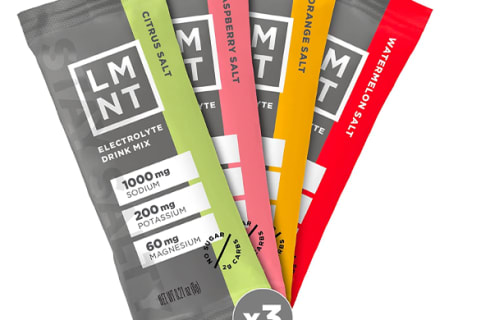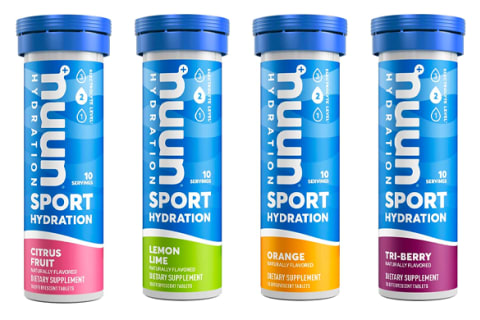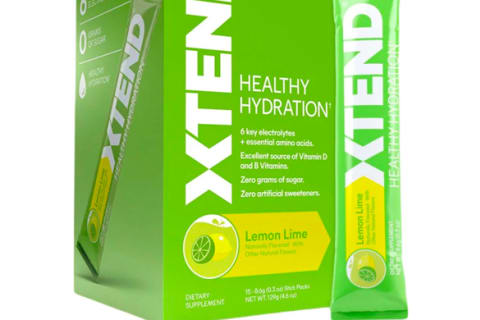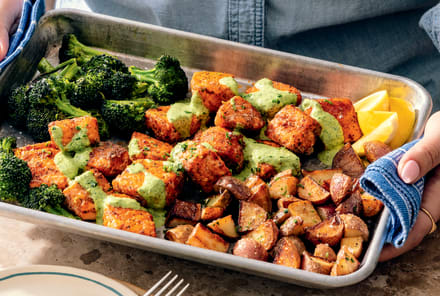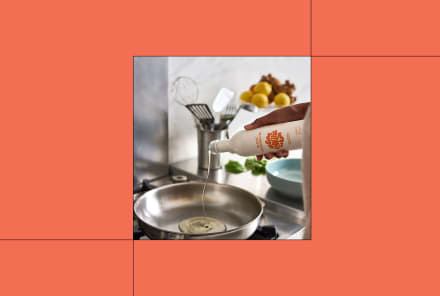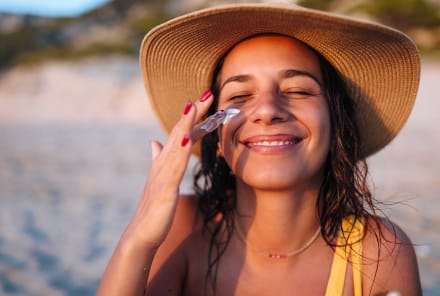Advertisement
10 Ways To Rehydrate Quickly & Avoid Dehydration In The First Place


Whether you live in a hot climate, have started a new exercise routine, or just feel constantly thirsty, learning how to rehydrate is important. Because just like food can act as medicine, water can also be a powerful force of good health.
But how can you rehydrate quickly—and avoid dehydration in the first place? Here are 10 top tips from MDs and RDs.
10 ways to rehydrate quickly
Frontload your water intake
According to Dana G. Cohen, M.D., co-author of the book Quench: Heal Up With Hydration, frontloading your water intake by drinking a big glass first thing in the morning can help you start your day out on a hydrated note before distractions creep in.
Make your water more interesting
Jazzing up your water might make you more likely to drink it. You can do this by adding lemon, fresh mint, or sliced fruit like oranges, strawberries, or honeydew. According to Cohen, "This gives your water a nice flavor and adds minerals and vitamins from the additional ingredients."
Drink more the older you get
We've all heard the golden rule of guzzling eight, 8-ounce glasses of water a day—but the reality is there's no universal guidance for hydration.
As Esther Ellis, M.S., RDN, LDN, a registered dietitian nutritionist, explains, "Water needs can vary based on climate, body size, and activity level, among other things."
Age can factor in, too: You're at higher risk for dehydration as you get older1 because of changes in body composition and kidney function.
Eat more plants
Plant-based foods, especially greens and fruits, have a high water content and can help you stay hydrated. Eating a lot of plants throughout the day or blending them up in a simple green smoothie (think just blended greens with fruit and water) can help you stay hydrated without relying on plain water alone.
According to Cohen, "the electrolytes and fiber help the plants hold onto that water better2 to better hydrate you."
Carve out "hydration breaks" in your schedule
We all take bathroom breaks throughout the day, but what about adding hydration breaks to your schedule as well? Use these mini breaks as an opportunity to drink some water and take a quiet moment to yourself.
Pay attention to urine output
Instead of religiously tracking your ounces of water intake, you can pay attention to the signals your body gives you about its current state of hydration. According to Cohen, peeing every two to three hours that you're awake is a good goal.
Pay attention to urine color
Another way to check in with your body is to take a quick glance at your urine before you flush. "Ideally, urine should be clear or pale yellow," says Ellis.
Think beyond water
"Water isn't the only drink that contributes to hydration," says Ellis. She explains that drinking milk, coconut water, and even tea can be ways to increase fluid intake.
A study comparing the hydrating effects of black tea and regular water showed no differences in hydration status3. Another small study found that consuming coconut water before exercising led to increased rehydration4. And yet another showed that drinking milk after exercise led to more fluid retention than drinking sports beverages5.
Don't overdo it
More water isn't always better. According to Cohen, while it's extremely rare to fall ill or die from too much water, it is possible. "But much more often I see slightly imbalanced electrolytes on blood tests from people who drink too much plain water," she says.
Instead of focusing just on drinking more and more water, you can focus on making your water more hydrating with the help of electrolytes.
Stop overthinking it
It's easy to get lost in the fray of tracking your water intake in an app, counting ounces, or trying to optimize the timing of your fluid intake, but according to Ellis, you don't need to overthink it.
"The best method of drinking water is the method that works best for you—whatever is going to encourage you to drink adequate water," she says.
Cohen agrees: "If anything, I often see people overcomplicate things with apps and gadgets rather than honing in on the signals from their own body."
How to make your water more hydrating
Instead of focusing on simply hydrating more, it might be worth hydrating smarter.
Cohen will sometimes have her patients drink less water overall, but with added factors that make the water they do drink more hydrating. "I have them give up a glass or two a day and instead add minerals. They say they feel better and are better satiated and quenched," she explains.
You can make your water more hydrating in a couple of ways. The first is to "add a pinch of sea salt or pink Himalayan salt, which has electrolytes6 and the full spectrum of minerals in it," says Cohen. "This makes it more hydrating from a cellular level," she continues.
That said, she would only recommend doing this once a day. "Not every glass of water needs to have salt in it," she adds.
The other option is to add an electrolyte mix to your water. Here are a few of mindbodygreen's favorites for staying hydrated.
mbg's top picks for electrolyte powders
Summary
Foods that help you hydrate
Remember that water also comes from the foods we eat. Foods with the highest water intake (all above 90%) include:
- Cucumber
- Iceberg lettuce
- Celery
- Tomatoes
- Zucchini and summer squash
- Asparagus
- Bell peppers
- Cabbage
- Cauliflower
- Mushrooms
- Spinach
- Strawberries
Drinks that dehydrate you
There are certain drinks and food that hydrate you, and there are also beverages to avoid if your goal is optimal hydration. Some common dehydrating drinks include:
Alcohol
If you ever experience more frequent bathroom breaks on a night out, you're not alone. Alcohol is known to cause diuresis, which is excessive production of urine. Interestingly, one study showed that wine and spirits were more dehydrating than 7non-alcoholic wine and water, so if you do indulge, lower alcohol options may be the least dehydrating.
Sugar-filled drinks
This includes soda, fruit juice, and sugar-sweetened coffees and teas. In fact, researchers found that trying to rehydrate with soft drinks actually worsened dehydration-associated kidney damage8. The same study found that rehydration with stevia-sweetened beverages did not show the same effects and helped increase hydration safely.
Why coffee isn't on this list
Dehydration symptoms
You might be wondering: Do I really need all these hydration tips? How can I tell if I'm even dehydrated in the first place? According to Ellis and the latest research9, some common symptoms of dehydration to look out for include:
- Extreme thirst
- Dizziness
- Confusion
- Dark-colored urine or less frequent urination
- Fatigue
- Lack of focus
- Headaches
- Lightheadedness
- Muscle weakness
- Rapid breathing
- Muscle cramps
If you experience severe dehydration symptoms such as a rapid heartbeat, dizziness, extreme thirst, or confusion, it's best to see a doctor.
What causes dehydration?
So, what are some of the top factors making us dehydrated? According to Cohen, those include:
- Excessive heat, either from the weather or certain workplace environments
- Processed foods, which make up a large portion of the standard American diet
- Prescription medications and over-the-counter medicines (mainly diuretics and laxatives)
- Environmental toxins (which, according to Cohen, emit toxins that our bodies have to work hard to process and eliminate)
Vomiting and diarrhea10 can also lead to dehydration. So, if you come down with an illness or have a condition like IBS that may cause frequent gastrointestinal symptoms, focusing on proper hydration is even more important.
Over-hydration risks and side effects
According to Cohen, hyponatremia (also known as "water intoxication") is extremely rare.
The water excretion rate of a healthy adult is about 20 liters per day and does not exceed 0.8 to 1.0 liters per hour11. Therefore, the maximum amount of water that a person with normal kidney function can drink is 800 to 1,000 milliliters per hour to avoid water intoxication. According to the same study, symptomatic hyponatremia usually occurs when one drinks 3 to 4 liters of water in a short period of time.
"Paying attention to the physical signs of thirst, hydration, and dehydration are helpful things to practice," says Cohen. As long as you are taking in water mindfully and listening to your body, overhydrating should not be an issue.
Frequently Asked Questions
What is the quickest way to rehydrate your body?
Drinking plain water or water with added electrolytes is the most effective way to rehydrate your body at home.
What are two warning signs of dehydration?
The two most common signs of hydration are dry lips and thirst.
How much water do I need to rehydrate?
To rehydrate, you can focus on avoiding common dehydrating substances, such as alcohol and sugar, and focus on hydrating beverages like plain water and coconut water.
How can I rehydrate after drinking alcohol?
Alcohol is known to dehydrate the body. To rehydrate, drink a glass of water upon waking and add a pinch of salt or an electrolyte powder. Don't drink more than a liter of water every few hours.
The takeaway
Mastering the skill of rehydrating fast at home is one of the best ways to support optimal health and prevent symptoms of dehydration. To rehydrate safely, pay attention to your body's signals and don't overdo it or overthink it. It's OK to lean on hydrating foods, tea, milk, and other liquids for hydration, and if you want to supercharge your plain water, try adding one of these effective electrolyte powders.
11 Sources
- https://pubmed.ncbi.nlm.nih.gov/26375144/
- https://www.ncbi.nlm.nih.gov/pmc/articles/PMC8465972/
- https://pubmed.ncbi.nlm.nih.gov/21450118/
- https://pubmed.ncbi.nlm.nih.gov/12056182/
- https://pubmed.ncbi.nlm.nih.gov/17459189/
- https://pubmed.ncbi.nlm.nih.gov/33086585/
- https://www.ncbi.nlm.nih.gov/pmc/articles/PMC5537780/
- https://www.ncbi.nlm.nih.gov/pmc/articles/PMC6195650/
- https://www.ncbi.nlm.nih.gov/books/NBK555956/
- https://www.ncbi.nlm.nih.gov/pmc/articles/PMC6282244/
- https://pubmed.ncbi.nlm.nih.gov/17981159/
Watch Next
Enjoy some of our favorite clips from classes
Enjoy some of our favorite clips from classes
What Is Meditation?
Mindfulness/Spirituality | Light Watkins
Box Breathing
Mindfulness/Spirituality | Gwen Dittmar
What Breathwork Can Address
Mindfulness/Spirituality | Gwen Dittmar
The 8 Limbs of Yoga - What is Asana?
Yoga | Caley Alyssa
Two Standing Postures to Open Up Tight Hips
Yoga | Caley Alyssa
How Plants Can Optimize Athletic Performance
Nutrition | Rich Roll
What to Eat Before a Workout
Nutrition | Rich Roll
How Ayurveda Helps Us Navigate Modern Life
Nutrition | Sahara Rose
Messages About Love & Relationships
Love & Relationships | Esther Perel
Love Languages
Love & Relationships | Esther Perel
What Is Meditation?
Box Breathing
What Breathwork Can Address
The 8 Limbs of Yoga - What is Asana?
Two Standing Postures to Open Up Tight Hips
How Plants Can Optimize Athletic Performance
What to Eat Before a Workout
How Ayurveda Helps Us Navigate Modern Life
Messages About Love & Relationships
Love Languages
Advertisement
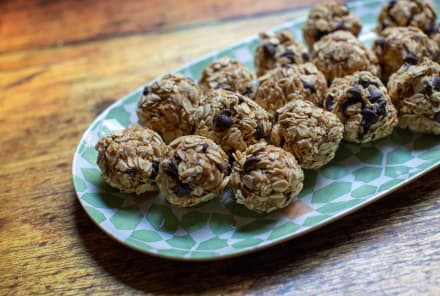
These Peanut Butter Cup Protein Bites Make The Perfect On-The-Go Snack
Molly Knudsen, M.S., RDN

Your Grandma's Go-To Supplement Is Once Again Popular (For A Good Reason)
Molly Knudsen, M.S., RDN

These Peanut Butter Cup Protein Bites Make The Perfect On-The-Go Snack
Molly Knudsen, M.S., RDN

Your Grandma's Go-To Supplement Is Once Again Popular (For A Good Reason)
Molly Knudsen, M.S., RDN
